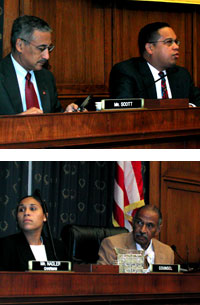ASKIAM
Senior Correspondent
Congressional bill on reparations commission finally gets a hearing after 19 years of trying on Capitol Hill
- Restitution: Historic victory in corporate reparations lawsuit (FCN, 01-03-2007)
- The Movement for Reparations (FCN, 08-16-2002)

WASHINGTON (FinalCall.com) – For the first time ever, the U.S. Congress officially studied the institution of slavery, its legacy, as well as U.S. efforts to address it and its consequences, during hearings by the Subcommittee on the Constitution, Civil Rights and Civil Liberties on Dec. 18.
It was the first time H.R. 40, the proposal to establish a Commission to Study Reparation Proposals for African Americans Act has had any kind of a hearing, even though the legislation has been introduced every year for almost two decades by Rep. John Conyers (D-Mich.), the new chairman, this year of the House Judiciary Committee.
“For over 19 years, I have introduced H.R. 40–not to spark controversy or promote division–but to direct attention to a historical wrong that warrants substantial consideration,” Mr. Conyers said when he gaveled the session to order. “With an H.R. 40 commission, this nation could come closer to racial equality and understanding. Slavery is a blemish on this nation’s history, and until it is addressed, our country’s story will remain marked,” he continued.
The racial disparities, which exist throughout the society are ample evidence, Mr. Conyers insisted, that the vestiges of slavery remain: the Black high school drop-out rate is 50 percent compared to 23 percent for Whites; national average scores in math, science and reading for Black 17-year-olds are comparable to the scores for White 13-year-olds; the poverty rate of Blacks, at 24 percent, is twice the national average.
H.R. 40 is “necessary for this nation,” Mr. Conyers insisted. “We are here today to help folks open their minds as they consider supporting H.R. 40. I truly believe that today’s hearing will start the national dialogue,” which can lead to the formal establishment of a slavery commission, he said.
“This hearing looks not just to the past, but to the legacy of our own history of slavery as it continues to affect race relations and inequality in present day America,” agreed committee member Rep. Jerrold Nadler (D-N.Y.). “It is our duty to ask the difficult questions and to face up to our responsibilities to remedy the ongoing injustice of slavery that remains a part of our society.”
The outright call for reparation payments, as well as for a commission to study reparations as a possible remedy for the victims of the trans-Atlantic slave trade, was supported by scholars, activists, church leaders, and even members of Congress.
“The horrors of the slave trade have yet to be addressed and the passage of time makes it even more difficult for us to respond to one of the most tragic, brutal, and for some, financially beneficial periods in American history,” Harvard Law professor Charles Ogletree testified.
“I support the call for reparations for the descendants of the millions of slaves who toiled in this country for decades, and who never were compensated for their labor,” said Prof. Ogletree.
“This was a momentous occasion here today, to provide an opportunity to address H.R. 40, which would establish a commission to look at the era of enslavement and whether it has impact on present day African Americans,” Kibibi Tyehimba, co-chair of the National Coalition of Blacks for Reparations in America (N’COBRA), told The Final Call. “This is about getting the truth out. We were very happy to be here today, so we can begin that process.
“It’s absolutely imperative that we understand that African life is as valuable as other lives: as Native Americans, as Jewish Holocaust victims, as Japanese Americans, and until we get to that point, we will continue to blame African descendants for their own oppression, and we’ve got to move past that.”
And while some White churches also came forward to offer their denomination’s apologies for involvement in the slave trade, not all Black reparations supporters were pleased with the timing or execution of the hearing. At least one activist, who spoke on condition of anonymity, told The Final Call the entire hearing was poorly planned, done with little prior notice, held at the end of the legislative year during the holiday season, and without the national attention that the subject of reparations for slavery deserves.
“Too many Episcopalians did not raise their voices,” against slavery “when God would have wished them to do so,” Bishop Thomas Shaw, from the Episcopal Diocese of Massachusetts said during the hearing. “Episcopalians were owners of slaves and of the ships that brought them to this land,” Bishop Shaw testified representing Presiding Bishop Katharine Jefferts Schori on behalf of the Episcopal Church. “Episcopalians lived in the north and in the south and, as a privileged church, we today recognize that our Church benefited materially from the slave trade.”
“The importance of the Episcopal Church being present to testify at this hearing on H.R. 40 cannot be overstated,” Jayne Oasin, social justice officer of the Episcopal Church, said according to a published report. “Our church must call itself and our country to repentance. Since we have always held and still hold great power in this country, we are duty bound to follow St. Paul’s admonition in Roman’s 12 to not ‘conform’ but to ‘transform’ the country by the power of the Holy Spirit working through us. Studying the issue of reparations for slavery is a key way to begin to transform ourselves, our church and our country.”
The Episcopal Church has “asked God’s forgiveness for our complicity in and the injury done by the institution of slavery and its aftermath,” Bishop Shaw said.
“Oversight Hearing on The Legacy of the trans-Atlantic Slave Trade.” Academic and public policy experts reviewed the legacy of the slave trade in American history and culture, and placed it into a Congressional record. Another hearing is scheduled in February.












